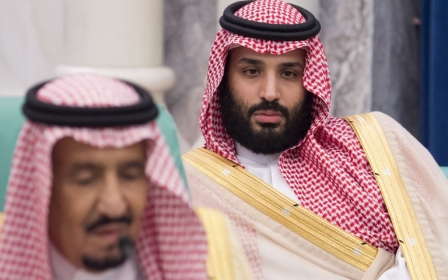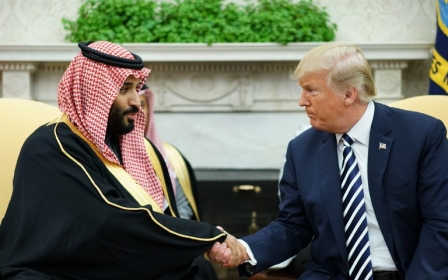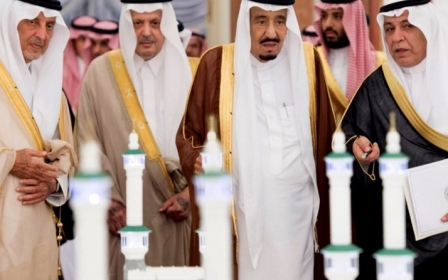US to penalise Saudi officials tied to Jamal Khashoggi's murder

The United States has announced plans to penalise 21 Saudi officials it says are responsible for the killing of journalist Jamal Khashoggi.
While the US State Department did not specify on Tuesday which Saudi citizens would be affected by the punitive measures, it said the individuals will have their US visas revoked or be made ineligible to enter the US.
"These penalties will not be the last word on the matter from the United States," US Secretary of State Mike Pompeo told reporters.
"We're making very clear that the United States does not tolerate this kind of ruthless action to silence Mr Khashoggi, a journalist, through violence."
The vast majority of the 21 individuals affected already have US visas, State Department Spokesperson Heather Nauert said.
US President Donald Trump said to reporters on Tuesday: "There should have never been an execution or a cover-up because it should have never happened.
"It was a total fiasco," Trump added.
There should have never been an execution or a cover-up, because it should have never happened. It was a total fiasco
- US President Donald Trump
To date, top White House officials have given Saudi Arabia and its de-facto ruler, Mohammed bin Salman (MBS) some leeway over the death of Khashoggi, a Saudi insider-turned-critic and prominent Washington Post columnist who was last seen entering the Saudi consulate in Istanbul on 2 October.
Pompeo told reporters that the US still values its relationship with Saudi Arabia and US President Donald Trump has repeatedly defended the country's multi-billion arms deal with the kingdom.
However, earlier on Tuesday, Trump called the Saudis' handling of Khashoggi’s death the “worst cover-up ever”.
Saudi officials have changed their story repeatedly since Khashoggi disappeared.
For more than two weeks, the Saudis insisted that the journalist left the building minutes after he arrived. However, on Friday, Saudi officials said Khashoggi was killed after a fight broke out inside the consulate.
Critics of Saudi Arabia have said they believe the Gulf kingdom is seeking to shield the crown prince from having to take any responsibility for Khashoggi's death.
Over the weekend, Saudi state media reported that King Salman had sacked Saud al-Qahtani, a former top aide to MBS, and four other officials over the killing.
And while a Saudi official told Reuters this week that MBS had no knowledge of the operation that led to Khashoggi's death and "certainly did not order a kidnapping or murder of anybody", that has left many unconvinced.
World leaders and human rights groups have criticised the latest Saudi version of events, saying their explanation lacks any credibility, as calls for an independent probe into what happened have grown louder.
CIA director sent to Turkey
Also on Tuesday, US Vice President Mike Pence said CIA Director Gina Haspel has been sent to Turkey to meet with investigators probing Khashoggi's murder.
He said Haspel will return to the US to brief the president, himself and members of the US administration on what the Turkish investigation has turned up.
Last week, a Turkish source who listened in full to the audio recording told Middle East Eye that Khashoggi was killed in seven minutes and his body was dismembered inside the consulate.
Two weeks ago, US senators invoked a human rights law to call on Trump to formally investigate the Khashoggi case and possibly determine appropriate sanctions against those involved.
The Magnitsky Law requires the president to act on requests for investigations by the leaders of the Foreign Affairs Committee.
Pompeo on Tuesday said he will work with the US Treasury Department to review the applicability of the sanctions triggered by the Magnitsky Law on those Saudi individuals that the US deems played a role in Khashoggi's death.
Middle East Eye propose une couverture et une analyse indépendantes et incomparables du Moyen-Orient, de l’Afrique du Nord et d’autres régions du monde. Pour en savoir plus sur la reprise de ce contenu et les frais qui s’appliquent, veuillez remplir ce formulaire [en anglais]. Pour en savoir plus sur MEE, cliquez ici [en anglais].




